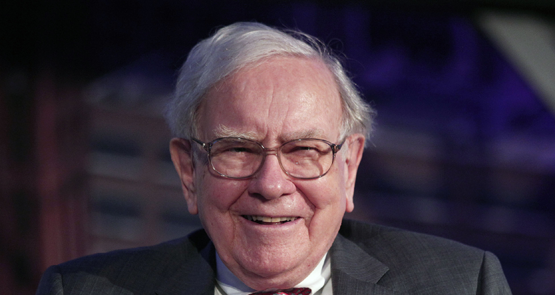
It’s not as if governments and financial regulators don’t have plenty to worry about at the moment, but the health of an 86-year-old man in Omaha, Nebraska, should be high on the list, especially in Australia. The answer to the question “what happens when Warren Buffett dies” is 1. extremely important to our financial sector and 2. entirely unclear.
We aren’t being ghoulish. There is simply no other businessman anywhere in the world with the clout or influence of the longtime chair of Berkshire Hathaway which, depending on share prices, is the fifth largest company in America, with a value of around US$440 billion — US$107 billion in cash, around US$134 billion in investments in listed companies. His ventures include: a major components maker for aircraft, America’s second largest railroad, home building, car dealership, candy making, furniture retailing, real estate brokers and agencies, clothing companies, food distribution, newspapers, and energy in the US midwest (his US energy companies are among the largest operators of renewables in the country) and UK. The company also owns 26% of Kraft Heinz.
Berkshire is the largest single investor in Apple, IBM, Coca Cola, American Express, and its largest investment is nearly 10% of Wells Fargo, one of America’s top three banks. And around September 29 he will become the largest investor in an even larger US bank, Bank America, when he converts preference shares bought in the financial crisis to help the bank survive.
But Buffett’s core business is insurance — both what Americans call property and casualty (what we call general insurance) as well as reinsurance — and it is an enormous business. Geico is the second biggest car insurer in the US and one of the largest in the world. General Re is one of his reinsurer business and is a top five reinsurer globally; the company has some smaller reinsurers as well, which makes the group perhaps the largest insurance operator globally.
And it’s via insurance that Buffett and his company occupy a very important position in the Australian financial system. General Re controls IAG through a 3.7% shareholding and what’s called a 20% quota share deal where, in exchange for 20% of IAG’s premiums each year, covers 20% of all its insurance claims. But as part of that deal, National Indemnity Company, or NICO), a subsidiary of Berkshire has been granted the right by the ASX to “maintain, by way of a right to participate in any issue of shares or to subscribe for shares, its percentage interest in the issued share capital of IAG in respect of a diluting event”. This means NICO is entitled to a percentage of any future capital raisings by IAG which is a handy defense should a predator appear.
But as of November, General Re will, with another reinsurer (the even larger Munich Re), control the fortunes of the listed AMP wealth management group, one of Australia’s largest fund managers. From November 1, AMP will operate a quota-share agreement with General Re, as well as an extension of the agreement with Munich Re to cover 60% of AMP Life’s retail portfolio, up from 50% earlier, and a new surplus cover deal with General Reinsurance to help manage volatility in individual claims. These are all types of reinsurance deals aimed at allowing AMP to take A$1 billion in capital from its life insurance business over time, while General Re and Munich Re cover much of the claims.
Unlike the IAG deal, there is no disclosed equity deal with AMP, but market analysts suspect there are small stakes already held in AMP and other listed insurers General Re has had deals with, such as Suncorp, which delivers effective control of the profitability and the share price of both companies.
So dominant are both General Re and Munich Re (which is close to the German owned general insurer, Allianz) that between them they control around 75% of the entire reinsurance market in this country. As Geoff Summerhayes, APRA’s insurance specialist board member, noted in a speech last October in Sydney.
“Pricing levels set in an environment of strong reinsurance capacity may not be sustainable under conditions where capacity narrows. We know that a spate of catastrophe events usually triggers reinsurer pricing adjustments and we need to be prepared for market hardening. The reinsurance market in Australia is also highly concentrated. Two reinsurers currently underwrite 79% of the reinsurance business in this country.”
Summerhayes left them unnamed. But last week’s AMP deal will probably lift that concentration past 80%.
Just for good measure, Buffett’s stake in Bank of America deepens Buffett’s involvement in this country: Berkshire operates a large investment bank here through its Merrill Lynch subsidiary. It also owns billions of dollars of Australian government bonds bought for their high yields and AAA rating, and used to help back the company’s operations in this country.
Despite being pressed for years, Buffett hasn’t made public what happens in the event of his death — what happens regarding his successor and his shareholding in the A class shares of Berkshire, worth around U$S270,000 each. Buffett’s first wife has died, his second is living, his children from his first marriage are involved in the business or his charities, but as to who inherits what and when, and the impact of US inheritance tax payments — no one knows. Such uncertainty will rattle sharemarkets in larger economies. Here, the impact is likely to be more concentrated.







Crikey is committed to hosting lively discussions. Help us keep the conversation useful, interesting and welcoming. We aim to publish comments quickly in the interest of promoting robust conversation, but we’re a small team and we deploy filters to protect against legal risk. Occasionally your comment may be held up while we review, but we’re working as fast as we can to keep the conversation rolling.
The Crikey comment section is members-only content. Please subscribe to leave a comment.
The Crikey comment section is members-only content. Please login to leave a comment.